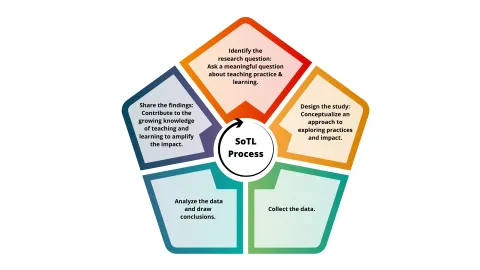SoTL Process

Identify the Research Question
Creating your SoTL Plan Worksheet
Taking time to think about all of the possibilities is an important step to any research project. This worksheet can provide you with a space for initial brainstorming.
Contact the Teaching Centre
As we revise our approach SoTL we would genuinely like to meet with you during this planning stage. We are in the unique position of knowing opportunities for collaborative work or other work happening at the university that may support your research.
Design the Study
Developing Methodology and Methods
When designing your study, the first step is developing your methodology and methods.
To develop your methodology you must consider the overall approach or framework that will guide how your research is conducted. This includes developing a rationale for using certain methods and connecting the chosen methods to research goals and philosophical underpinnings. Methods refer to the specific techniques, tools, or procedures used to gather and analyze data. These are the practical steps taken to conduct research.
Ethics
After developing your methodology and methods, you must apply for ethics approval with Arise. To some this may feel like a daunting task, but we are here to support you in this process.
Partnering with a student benefits both your research and students.
We can support you in the process of hiring a graduate or undergraduate students as a research assistant.
Their assignment of duties could include tasks such as: research design, transcription, data collection and analysis, or writing and dissemination. Be sure to check the collective agreement to see what is possible.
Checklist for working with graduate students.
NOTE: Undergraduate students are not under the same collective agreement. All the details below pertain solely to graduate students.
- Determine which type of appointment aligns with your research plan (full-fixed, half-fixed, or casual).
- Post the appointment on Career Bridge with human resources (allow 2 weeks).
- Interview student applicants (allow 2 weeks). NOTE: be sure it is clear in the application that they are entering/continuing in a graduate program. (Be forewarned some people apply for anything and everything). Should you need confirmation please reach out to coop student via sgs.awards@uleth.ca for help.
- Offer position to student and complete the Offer of Appointment using template provided (ideally 20 working days before start of work).
- Complete the Assignment of Duties and sing the template provided, collaboratively with your student employee (must be completed no later than 1 week after the start of work).
Data Collection
Data collection is the execution phase of your research methods, where you gather the necessary information to answer your research questions. Involving student research assistants in this process not only enhances the efficiency of your project but also provides invaluable hands-on experience for the students.
Regardless of the tools or techniques you employ, our team is here to offer comprehensive support throughout your data collection process.
Analyse the Data and Draw Conclusions
Analysis
Depending on your methods, there are a variety of data analysis tools that you can use. For qualitative data, tools like NVivo can be used to code text, audio, or visual data, allowing for deep thematic analysis. Quantitative data, in contrast, often requires rigorous statistical analysis, which might involve software such as SPSS, R, or Python.
Regardless of the analytical approach you take, we are here to provide the necessary support throughout this critical stage. This includes guidance for both you and any student research assistants involved in your project, ensuring that you have the resources and expertise needed to achieve accurate and reliable results.
Writing
Writing is a crucial component of the knowledge production process, often representing one of the most time-consuming stages of research. We encourage you to adopt a writing approach that aligns with your unique style and workflow. Engaging research assistants in this process can be highly beneficial, offering them valuable experience while providing you with additional support.
We are here to assist you every step of the way and are happy to answer any questions you may have while completing your project.
Share the findings
Discovering new understanding about teaching and learning behind closed doors has minimal impact. When your research plan includes robust and meaningful ways of disseminating this new knowledge, the impact is felt across our institution and the broader educational world.
Various options exist for dissemination:
- Talking about Teaching
- SPARK presentations
- peer-reviewed journal publications
- conference presentations (SoTL conferences or other conferences)
- workshop offerings (department meetings or opportunities outside of our institution)
- other creative and impactful sharing methods
